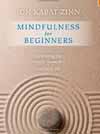Mindfulness for Beginners and Secularists (Book Review & Video)
Recently I’ve been contacted by atheists/secularists who have heard that mindfulness is a great practice, backed up by scientific study. These people want to learn mindfulness and meditation, but aren’t interested in Buddhism. I went through my own library, but found most of my books on mindfulness and meditation focused a great deal on Buddhist teachings.
So, under the suggestion of one of our own forum members, I read a book I can recommend to those who are either new to mindfulness, or new and want to learn mindfulness without having to learn Buddhism as well. The book is Mindfulness for Beginners by Jon Kabat-Zinn.
Note: This is NOT transcendental meditation, nor is this a practice that grants you magical powers, a connection to god, or the ability to levitate. Mindfulness is a practical skill we all need to develop. Mindfulness is secular!
Jon is Professor of Medicine Emeritus and founding director of the Stress Reduction Clinic and the Center for Mindfulness in Medicine, Health Care, and Society at the University of Massachusetts Medical School. Additionally, he was a student of the Zen tradition.
There are several aspects of this book I really like for beginners, particularly secularists:
- Chapters are short and to the point
- Explains well what mindfulness is, and how you benefit by developing it
- Benefits mentioned are backed by scientific study and grounded in science (Jon has his degree in molecular biology, so talking science is second nature to him)
- Both benefits and drawbacks to thinking are explained (This is often a point of confusion in Buddhism, and Jon makes the scoop on thinking clear here)
- Ethics from mindfulness is explained well (Atheists and secularists know religion is not needed to live an ethical life, but here Jon explains how we can understand it better through mindfulness)
I like Jon’s straight forward writing style. Each chapter in the book is only a page an a half long, making his point in each chapter. The text is interesting and moves along nicely. While Jon does make mention of Buddha and Zen in a few places, you aren’t going to feel like he’s trying to sell you Buddhism, nor are you going to feel bogged down in the history of mindfulness.
It’s important to know what mindfulness is, why you benefit from developing it, how it changes your outlook on life. In the ending chapters, the practice for developing mindfulness is detailed. At the very end, Jon has a chapter on recommended reading. Of course, several of the books mentioned are his, and a few include Zen or Buddhism, but this list is a great one to start with if you want to know more after reading this book and digging into a meditation and mindfulness practice.
Also, if you’d like to watch a talk Jon gave at Google on Mindfulness, here it is:

